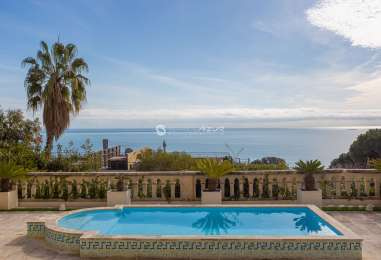Owning Real Estate through a French SCI or a Monegasque SCP: What’s the Difference?
For both French and international buyers, acquiring real estate can be structured through a legal entity, particularly for wealth management, succession planning, or optimizing family asset organization.
The most commonly used structures are the French SCI (Société Civile Immobilière) and the Monegasque SCP (Société Civile Particulière). Both allow collective ownership of real estate, simplify property management, and provide significant flexibility in the allocation of shares among family members.
However, there are important differences between these two options, especially for buyers who are not French tax residents, both from a legal and fiscal perspective.
1. The French SCI (Société Civile Immobilière)
The SCI is a civil company specifically designed to hold and manage real estate assets. It is not a commercial company, but rather a family-oriented structure ideal for purchasing an apartment, a house, or a rental property.
The main purpose of an SCI is to provide flexibility and organization for property owners: defining each member’s share, determining who manages the property, distributing rental income, and planning the transfer of shares to children.
1.1. Legal Nature of an SCI
The SCI is considered a transparent structure for tax purposes. The company itself does not pay income tax; instead, the income flows directly to the shareholders, who then declare it on their personal income tax (IR) return.
An SCI can be established with a very low initial capital, and its duration can extend up to 99 years. Shareholders can be adults or minor children, provided that the statutes clearly define the rules of representation. The minimum legal requirement is two shareholders.
In summary, an SCI is highly adaptable to all family structures and allows for tailored wealth management.
1.2. Formation and Management
An SCI is generally established at the same time as the property acquisition. A notary or lawyer drafts the statutes, registration grants the company its legal status and SIREN number, an official notice is published, and a separate bank account is opened. The SCI is then ready to acquire and manage real estate assets.
Each year, shareholders are required to hold a general meeting, keep minutes of decisions, and file the 2072 tax return.
If the chosen tax regime is corporate income tax (IS), the SCI must maintain full accounting records, similar to those of a small commercial company.
1.3. Taxation of an SCI
Taxation for Long-Term Unfurnished Rentals
Default Regime: Personal Income Tax (IR)
Income from the SCI is allocated among the shareholders:
-
French tax residents pay income tax according to their marginal tax rate, plus social contributions of 17.2%.
-
Non-residents pay a minimum tax of 20%. If income exceeds €27,519, the rate can rise to 30% plus social contributions (17.2% or 7.5% for EU/EEA/Swiss residents).
The system is fully transparent: each shareholder declares only their share of income and pays the corresponding tax.
Optional Regime: Corporate Income Tax (IS)
The SCI may irrevocably opt for IS:
-
Profits are taxed at 25%, or 15% on the first €42,500 under certain conditions.
-
This regime allows depreciation of the property, and deduction of loan interest and expenses.
-
However, tax advantages related to the holding period disappear upon sale, and full accounting records become mandatory.
Note:
An SCI cannot engage in short-term furnished rentals (e.g., Airbnb or vacation rentals). Such activity is considered commercial and automatically reclassifies the SCI as a commercial company, subject to IS taxation and mandatory commercial accounting.
Sale of a Property or SCI Shares
Under the personal income tax (IR) regime, the capital gain realized on the sale of a property or SCI shares is taxed at 19%, plus social contributions of 17.2%.
Allowances for holding period apply:
-
After 22 years of ownership, the capital gain is fully exempt from income tax.
-
After 30 years of ownership, exemption also applies to social contributions.
Local Taxes
The property tax (taxe foncière) and residence tax (taxe d’habitation) are payable on property held through an SCI, just as they would be for direct ownership.
Additionally, if an individual shareholder’s ownership exceeds €1,300,000, they are also liable for the French Real Estate Wealth Tax (IFI), as if they held the property directly.
1.4. SCI and Inheritance Tax
An SCI facilitates the transfer of real estate assets to children. Every 15 years, it is possible to gift each child SCI shares worth up to €100,000 without paying gift tax.
It is also possible to transfer the bare ownership (nue-propriété) to children while retaining the usufruct for oneself. Upon the death of the usufructuary, full ownership passes to the children without additional taxation.
However, it is important to note that SCI shares are considered French real estate assets. Therefore, French inheritance tax applies, even if the heirs reside abroad.
Rates can reach 45% for direct descendants and up to 60% for unrelated beneficiaries.
1.5. Costs of Managing an SCI
-
Creation: €1,500 to €2,500 if the statutes are drafted by a notary or lawyer.
-
IR regime: Accounting can be managed independently (e.g., Excel) or by an accountant, at an annual cost of €700 to €1,000.
-
IS regime: Full accounting is mandatory, with an annual cost of €1,500 to €2,500.
-
Filing the 2072 tax return: Free if done independently, or €300 to €500 if handled by an accountant or property manager.
2. The Monegasque SCP (Société Civile Particulière)
A Structure for International Families and High-Net-Worth Owners
The Monegasque SCP is the close cousin of the French SCI, but with a very different structure and set of advantages.
The SCP is chosen by families who value confidentiality, well-thought-out estate planning, and the ability to retain not only real estate but also investments.
2.1. Legal Nature of an SCP
The SCP (Société Civile Particulière) is a civil company governed by Monegasque law, allowing ownership of not only real estate but also movable assets, such as cash, investment portfolios, and corporate shares.
An SCP must have at least two shareholders and maintain a registered office in Monaco. Shareholder information is not published in public registries, which is one of its main advantages.
2.2. Taxation and Ownership of French Real Estate
When an SCP holds property in France, French taxes remain applicable: property tax (taxe foncière), capital gains tax, residence tax (taxe d’habitation), and real estate wealth tax (IFI) must all be paid in France.
An SCP is not a way to avoid French income tax on real estate.
Its true advantage lies in succession planning and inheritance structuring, offering confidentiality and flexibility for families.
2.3. Inheritance: The Main Advantage of an SCP Compared to an SCI
Succession planning is the most sensitive and decisive factor when choosing a property-holding structure.
Unlike a French SCI, whose shares are always considered French real estate and thus subject to French inheritance tax, the situation is different with a Monegasque SCP.
French case law has recognized that SCP shares can be treated as movable property and therefore inherited under Monegasque law, provided that three conditions are simultaneously met:
1. The property in France is owned by an SCP registered in Monaco.
2. The SCP shareholders are non-French tax residents.
3. The SCP’s assets consist of more than 50% movable assets (cash, shares, stakes, luxury assets and collectibles, etc.).
Only under these conditions can the French tax authorities consider that SCP shares do not constitute French real estate.
In this case, French inheritance tax does not apply, and the transfer occurs according to Monegasque law, where no direct-line inheritance tax is due.
For this reason, the SCP is considered an effective tool for international succession planning: it allows ownership of French real estate while enabling it to be transferred as movable property under Monegasque law.
Estimated Costs of Managing an SCP
Unlike a French SCI, the Monegasque SCP is a strictly regulated private civil company, and its management is always more formal and costly. Certain elements are mandatory under Monegasque law, which explains the higher expenses.
-
Creation of the SCP: €2,000 to €4,000 via a notary or lawyer in Monaco.
-
Mandatory accounting: €1,500 to €4,000 per year, higher if the SCP holds an investment portfolio.
-
Registered office in Monaco (domiciliation): €900 to €1,600 per year.
-
IT manager: €600 to €1,200 per year.
-
3% Tax Declaration (Form 2746) in France: €300 to €600 per year.
Conclusion: The SCP is a more expensive and formal structure, designed for large international estates and advanced succession planning.
SCI or SCP: Which to Choose?
The French SCI is suitable for those seeking a simple, transparent, and low-cost structure to hold real estate in France, with minimal formalities and clear management rules.
The Monegasque SCP, on the other hand, is a tool designed for international families who prioritize confidentiality, data protection, financial asset management, and advanced succession planning. This structure can significantly reduce exposure to French inheritance taxes, but requires more formal and costly administration.
For rental and sale of real estate, tax rules are identical for both structures. The main differences lie in succession planning, confidentiality, management costs, and asset composition.
The optimal choice depends on the investor’s objectives, family situation, and long-term property ownership strategy.
This article is for informational purposes only and does not replace personalized advice from a notary or tax advisor.





































